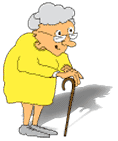October 5, 2004 [Volume 5, Issue 21]
To Your Health is brought to you by:
- The High Price of Musculoskeletal Disorders
- Cough Syrups Don't Reduce Cough Symptoms
- Calcium: The Key to a Happy Colon
The High Price of Musculoskeletal Disorders
Musculoskeletal disorders are conditions that affect the muscles, tendons, ligaments and joints. Previous studies have shown that women are more likely to suffer musculoskeletal disorders than men, but scientists have disputed these results, based on the belief that women are more likely than men to admit they are in pain, and therefore more likely to seek treatment.
 A group of U.S. researchers attempted to settle the dispute by reviewing more
than 50 articles on musculoskeletal disorders in both men and women. They found
that women were indeed more than twice as likely as men to develop
musculoskeletal disorders in the upper body - specifically, disorders of the
neck, shoulders, arms and hands.
A group of U.S. researchers attempted to settle the dispute by reviewing more
than 50 articles on musculoskeletal disorders in both men and women. They found
that women were indeed more than twice as likely as men to develop
musculoskeletal disorders in the upper body - specifically, disorders of the
neck, shoulders, arms and hands.
Regardless of gender, if you suffer from pain, it's time to see your chiropractor! A doctor of chiropractic can diagnose your current condition and offer treatments to relieve pain and improve your general well-being. For more information on the benefits of chiropractic, visit www.chiroweb.com/find.
Reference: Treaster DE, Burr D. Gender differences in prevalence of upper extremity musculoskeletal disorders. Ergonomics April 2004;47(5):495-526.
Cough Syrups Don't Reduce Cough Symptoms
Upper respiratory infections (URIs) are one of the most common reasons parents bring their children to the doctor. A frequent symptom of a URI in children is coughing, which can make children - and their parents - miserable over time. Most of the time, a doctor will simply recommend an over-the-counter or prescription cough syrup. But as this study shows, cough medicines don't always do what they're supposed to.
Researchers examined 100 children with URIs and divided them into three groups. The first group received a syrup containing dextromethorphan, a common ingredient in cough syrups. The second group received a syrup containing another common ingredient, diphenhydramine. The third group received a placebo syrup that was identical in appearance to the other two syrups, but had no ingredients intended to improve cough symptoms. Parents were asked to rate the children's symptoms of coughing and other factors over a 24-hour period.
When the researchers compared the parents' ratings, they found that the medicated cough syrups were no better than placebo in preventing coughs or improving children's sleep. In fact, children given the placebo syrup coughed less frequently than children given syrups containing either active ingredient. As this study suggests, cough medicines appear no better than placebo at reducing children's coughs. While this doesn't mean that medicated cough syrups aren't any good, ask your doctor about these study results and investigate more effective alternatives. A substantial body of research suggests that many commonly prescribed medications are ineffective and/or associated with dangerous side-effects.
To learn more, visit www.chiroweb.com/find/archives/general/drugs.
References: Paul IM, Yoder KE, Crowell KR, et al. Effect of dextromethorphan,diphenhydramine, and placebo on nocturnal cough and sleep quality for couching children and their parents. Pediatrics July 2004;114(1):e85-90.
Calcium: The Key to a Happy Colon
 Calcium has been shown to have many positive benefits, including helping to build
strong bones and teeth, aiding in weight loss, and now, staving off intestinal
polyps, according to research published in a recent issue of the Journal of the
National Cancer Institute. Researchers studied just over 900 patients assigned
randomly to receive 1,200 mg/day of calcium carbonate or placebo. Follow-up
colonoscopies were administered to each patient, approximately one and four years
after the initial presence of colorectal polyps was assessed.
Calcium has been shown to have many positive benefits, including helping to build
strong bones and teeth, aiding in weight loss, and now, staving off intestinal
polyps, according to research published in a recent issue of the Journal of the
National Cancer Institute. Researchers studied just over 900 patients assigned
randomly to receive 1,200 mg/day of calcium carbonate or placebo. Follow-up
colonoscopies were administered to each patient, approximately one and four years
after the initial presence of colorectal polyps was assessed.
Results: Researchers found that polyps occurred less frequently among the calcium group than the placebo group, and that calcium reduced the risk of all polyps by 14 percent and advanced polyps by 35 percent. The authors also suggest that intakes over 1,200 mg of calcium a day may be necessary to maximize its benefits, and that dietary fiber and dietary fat may also play a role.
Still not convinced about the value of calcium? Well, guess what? It also helps regulate heart function and lower cholesterol. So don't delay! Be kind to your colon, and start your calcium regimen today. Good food sources include dairy products, meat, fish, eggs, cereal products, beans, and fruits. If finding the time to get proper calcium intake from food seems to be a problem, a daily multivitamin is a good alternative.
A comprehensive listing of vitamins and minerals, including brief summaries, recommended daily intake, and common food sources can be found at www.chiroweb.com/find/tellmeabout/nutrients.html.
Reference: Wallace K, Baron JA, Cole BF, et al. Effect of calcium supplementation on the risk of large bowel polyps. Journal of the National Cancer Institute, June 16, 2004;96(12):921-5.
This issue features a number of articles you will want to share with your family, friends and co-workers. Please feel free to forward this newsletter to them via e-mail. If you have received this e-mail newsletter from someone else, you may subscribe free of charge and begin receiving your own copy by going to: www.chiroweb.com/newsletter/TYH/subscribe.php
Visit Dynamic Chiropractic's "Ask a Doctor of Chiropractic" forum at www.chiroweb.com/find/ask.html, where 15 doctors of chiropractic are waiting to answer any of your health questions.
Thank you for subscribing to To Your Health. If you have received this newsletter in error or wish to unsubscribe, you may remove your name from our e-mail subscription list at www.chiroweb.com/newsletter/TYH/unsubscribe.php.
If you have any questions regarding your subscription, please complete this form at www.chiroweb.com/newsletterhelp/TYH.
This edition of To Your Health newsletter is co-sponsored
by:
